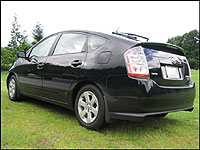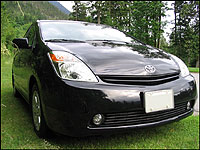2004 Toyota Prius Road Test
6-27-2004
by
Alexandra Straub
, Canadian Auto Press
|
The new electric motor, however, is quite a bit more powerful than the outgoing version. The old one could only manage
 |
| With both the gas and electric engines working together, 106-hp is produced. (Photo: Alexandra Straub, Canadian Auto Press) |
44-hp, while the new motor is up 23 horsepower to 67. The new electric's torque is even more robust, making 295 lb-ft from 0 to 1,200 rpm compared to the old motor's 258 lb-ft from 0 to 400 rpm - and diesel owners think they have a torque advantage. An approximate combined electric/gasoline horsepower rating is 106, compared to 98 in the old car.
I quote Toyota for the most accurate description of the new powertrain. "Like the original Toyota Hybrid System (THS) employed in the previous Prius, Hybrid Synergy Drive (HSD) is defined as a "full hybrid system." Unlike competitive systems currently on the market, the full hybrid system is capable of operating in gas or electric modes, or with gas and electric power together."
"Compared to the hybrid technology used in the previous model, the new Hybrid Synergy Drive provides longer periods of
 |
| "When the Prius is coasting or the brakes are applied, the electric motor functions as a generator." (Photo: Alexandra Straub, Canadian Auto Press) |
electric-mode-only driving, as well as significantly higher peak electrical power. HSD uses a 50-percent more powerful 50-kilowatt drive motor operating at up to 500 volts... The continuously variable transmission does not have fixed gear ratios, but instead provides infinitely variable ratios in response to driving conditions."
There is also a regenerative braking system on the Prius that further boosts system efficiency. "When the Prius is coasting or the brakes are applied, the electric motor functions as a generator, capturing kinetic energy that would normally be lost as heat through brakes, by transforming it into usable electricity to recharge the batteries." |
|
|

